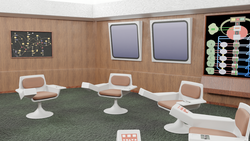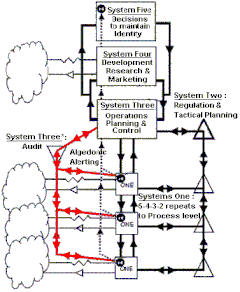|
Stafford Beer
Anthony Stafford Beer (25 September 1926 – 23 August 2002) was a British theorist, consultant and professor at the Manchester Business School.[1] He is best known for his work in the fields of operational research and management cybernetics.[2] BiographyEarly lifeBeer was born in Putney, London in 1926. His father was William John Beer, chief statistician at Lloyd's Register of Shipping, who shared a birthday with his mother, Doris Ethel Beer.[3] At age 17 Stafford Beer was expelled from Whitgift School. He enrolled for a degree in philosophy at University College London before leaving to join the army as a Gunner in the Royal Artillery in 1944. He soon received commissions, first in the Royal Fusiliers, and then as a company commander in the 9th Gurkha Rifles. Beer served in India, staying there until 1947, when he returned to England and was assigned to the Human factors Branch of Operations research at the War Office. In 1949, he was demobilised, having reached the rank of captain.[4] Beer did not use his given first name "Anthony", instead preferring his middle name of “Stafford.” His younger brother Ian also shared this middle name. When Ian was sixteen, Beer persuaded his brother to sign a document promising not to use “Stafford” as part of his name because Beer “wanted the ‘copyright’ of [the name] Stafford Beer.”[5] United SteelIn 1956 he joined United Steel and persuaded the management to fund an operational research group, the Department of Operations Research and Cybernetics, which he headed. This was based in Cybor House, and they installed a Ferranti Pegasus computer, the first in the world dedicated to management cybernetics.[6] SIGMAIn 1961 he left United Steel to start an operational research consultancy in partnership with Roger Eddison called SIGMA (Science in General Management). Beer left SIGMA in 1966 to work for a SIGMA client, the International Publishing Corporation (IPC). He left IPC in 1970 to work as an independent consultant, focusing on his growing interest in social systems.[citation needed] Cybersyn  In mid-1971, Beer was approached by Fernando Flores, then a high-ranking member of the Chilean Production Development Corporation (CORFO) in the newly elected socialist government of Salvador Allende, for advice on applying his cybernetic theories to the management of the state-run sector of the Chilean economy.[7][8] This led to Beer's involvement in the never-completed Cybersyn project, which aimed to use computers and a telex-based communication network to allow the government to maximise production while preserving the autonomy of workers and lower management. Beer also was reported to have read and been influenced by Leon Trotsky's critique of the Soviet bureaucracy.[9] According to another senior member of the Cybersyn team, Herman Schwember, Beer's political background and readings completely derived from works written by Trotsky and Trotskyists. Schwember himself disapproved of Trotsky's approach.[10] Although Cybersyn was abandoned after Allende's death during the Pinochet coup in 1973, Beer continued to work in the Americas, consulting for the governments of Mexico, Uruguay and Venezuela. Later activityIn the mid-1970s, Beer moved to mid-Wales where he lived in an almost austere style, developing strong interests in poetry and art. In the 1980s he established a second home on the west side of downtown Toronto and lived part of the year in both residences. He was a visiting professor at almost 30 universities and received an earned higher doctorate (DSc) from the University of Sunderland and honorary doctorates from the University of Leeds, the University of St. Gallen, and the University of Valladolid. He was president of the World Organization of Systems and Cybernetics. Falcondale Collection In July 1994 Beer ran a residential course at the Falcondale Hotel in Lampeter. Nine sessions were recorded as a video learning resource, and are collectively known as the Falcondale collection. They are available online at the Data Repository of Liverpool John Moores University.[11] The sessions covered art, science and philosophy as well as the practical application of cybernetics in society, government, community, management and business. Transcripts were made of the discussions and are also available from the same repository.[11] Family lifeHe was married twice, in 1947 to Cynthia Hannaway, and in 1968 to Sallie Steadman. His partner for the last twenty years of his life was Allenna Leonard, a fellow cybernetician. Beer had five sons and two daughters, one of whom is Vanilla Beer, an artist and essayist.[citation needed] Work Management cyberneticsAccording to Jackson (2000) "Beer was the first to apply cybernetics to management, defining cybernetics as the science of effective organization". In the 1960s and early 1970s "Beer was a prolific writer and an influential practitioner" in management cybernetics. It was during that period that he developed the viable system model, to diagnose the faults in any existing organizational system. In that time Forrester invented systems dynamics, which "held out the promise that the behavior of whole systems could be represented and understood through modeling the dynamical feedback process going on within them".[13] Cybersyn During the administration of Salvador Allende in Chile, in the early 1970s, Beer was closely involved with a visionary project, Cybersyn, to apply his cybernetic theories in government. The project's ultimate goal was to create a network of computers and communications equipment that would support the management of the state-run sector of Chile's economy; at its core would be an operations room where government managers could view important information about economic processes in real time, formulate plans of action, and transmit advice and directives to managers at plants and enterprises in the field.[14] However, consistent with cybernetic principles and the ideals of the Allende government, its designers aimed to preserve worker and lower-management autonomy instead of implementing a top-down system of centralised control. The system used a network of about 500 telex machines located at enterprises throughout the country and in government offices in Santiago, some of which were connected to a government-operated mainframe computer that would receive information on production operations, feed that information into economic modelling software, and report on variables (such as raw material supplies) that were outside normal parameters and might require attention. The project, implemented by a multidisciplinary group of both Chileans and foreigners, reached an advanced prototype stage, but was interrupted by the 1973 coup d'état.[14] Viable System Model The Viable System Model (VSM) is a model of the organisational structure of any viable or autonomous system. A viable system is any system organised in such a way as to meet the demands of surviving in the changing environment. One of the prime features of systems that survive is that they are adaptable. The VSM expresses a model for a viable system, which is an abstracted cybernetic description that is applicable to any organisation that is a viable system and capable of autonomy. Syntegration and Team SyntegritySyntegrity is a formal model presented by Beer in the 1990s and now is a registered trademark. It is a form of non-hierarchical problem solving that can be used in a small team of 10 to 42 people. It is a business consultation product that is licensed out to consulting firms. The term comes from the words "synergistic" and "tensegrity".[15] POSIWIDStafford Beer coined and frequently used the term POSIWID (the purpose of a system is what it does) to refer to the commonly observed phenomenon that the de facto purpose of a system is often at odds with its official purpose. In an address to the University of Valladolid, Spain in October 2001, he said "According to the cybernetician the purpose of a system is what it does. This is a basic dictum. It stands for bald fact, which makes a better starting point in seeking understanding than the familiar attributions of good intention, prejudices about expectations, moral judgment or sheer ignorance of circumstances."[16] This principle has been used to describe Social Machines as intelligent, for example in the case of "games with a purpose",[17] and it provides a link between AI and cybernetics. AwardsBeer received awards from the Royal Swedish Academy of Engineering Sciences in 1958, from the United Kingdom Systems Society, the Cybernetics Society, the American Society for Cybernetics, and the Operations Research Society of America.[citation needed] LiteratureStafford Beer wrote several books and articles:[18]
See alsoReferences
Further reading
External linksWikiquote has quotations related to Stafford Beer. Wikimedia Commons has media related to Stafford Beer.
|
||||||||||||||||
